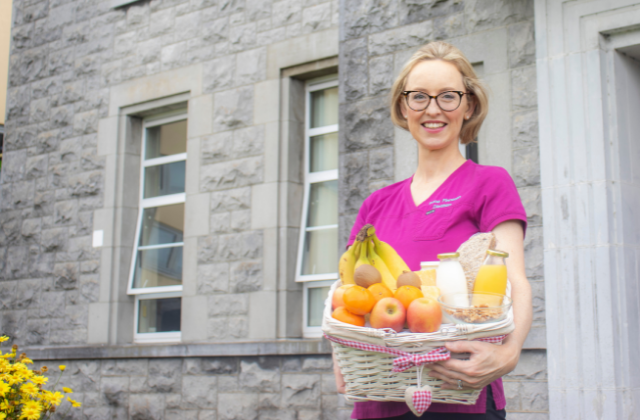![]()
You are here
Positive Ageing Week – Nutrition Advice from Roscommon University Hospital

To mark Positive Ageing Week which runs from 27 September to 01 October, the Frailty Intervention Team at Roscommon University Hospital (RUH) would like to offer advice on healthy eating for older adults.
Fiona Finneran, Senior Frailty Dietitian at RUH said, “As we age we don’t always absorb the nutrients from our food as well as we used to and as a result our body muscle starts to decline. The good news is we can counteract some of this by eating a balanced diet.
“If you are over 65, here are some tips that can help ensure your diet is balanced with all the right nutrients:
Stay hydrated – did you know that by the time you feel thirsty you are already dehydrated? Water, milk, tea (between meals rather than with meals) and unsweetened fruit juice, all count toward your daily fluid intake. If you are a woman, you should aim to drink 6 to 8 glasses (1.6 litres) each day, while men should aim for about 8-10 glasses (2 litres) each day, unless your doctor has told you otherwise.
Protein is so important to help keep muscles strong and reduce the risk of falling. Try to have a protein rich-food such as meat, fish, poultry, cheese, eggs, peas, beans, lentils or nuts with at least two of your main meals each day and include snacks of milk, yogurts, nuts or seeds in between.
Energy and fibre – the best foods for energy are bread, potatoes, rice, pasta and cereals – always include one of these at each of your three main meals. Increase you fibre intake by choosing wholemeal or wholegrain breads and cereals as these help keep your bowels healthy and prevent constipation.
Calcium and Vitamin D - calcium is important for strong bones while vitamin D helps get the calcium into our bones. Include 3 portions of calcium-rich foods each day. An example of a portion is a glass of milk (200ml) or a pot of yogurt or 2 thumb-sized pieces of cheese. Full fat and low fat dairy products contain the same amount of calcium, but not all dairy-free alternatives contain calcium so always check the label. The Department of Health now advises everyone over 65 years take a 15ug (600IU) vitamin D supplement daily. Always check with your doctor or pharmacist first as you may already be on a prescribed dose of vitamin D.
Iron and Vitamin C - iron is essential for carrying oxygen around your body. The best sources of iron are beef, lamb, pork, fish and poultry. To help your body absorb the iron from the meat or fish, have it with something rich in vitamin C such as potatoes, vegetables, salad or fruit particularly if you are having a plant-based source of iron such as peas, beans, lentils, dark green vegetables, nuts or seeds.
B Vitamins – Vitamin B2, B6, B12 and folate are particularly important to help keep blood and nerves healthy and help us use the energy from our food. Regularly including meats, dairy, green leafy vegetables and pulses, in addition to foods fortified with folic acid such as milks and cereals, will help ensure a balanced intake of these vitamins.
“Sometimes as we age our appetite and food intake can decrease which can cause us to lose weight without trying. If this happens speak with your doctor and ask for a referral to your local dietitian service. Try to eat three small meals and three snacks each day. Consider ‘ready meals’ for days you don’t feel like cooking or enquire about local shops, restaurants or support services that will deliver meals.
“Remember, variety is key. The greater the variety and colour in your diet the better the chance you are eating a balanced diet. And above all – always enjoy your food!”
The article above is specific to the following Saolta hospitals::
Roscommon University Hospital (RUH)
